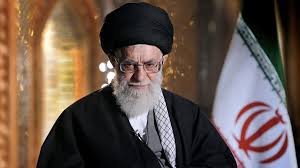
Iran Ready to Destroy "Israel"

Habib Fayyad
As-Safir newspaper, 23-03-2013
It seems that the Islamic Republic of Iran is getting ready to reposition in the region and the world, building on the continuity of confrontation and the refusal to backslide in the face of pressures and challenges. This is what could be read in the fresh speech of the Islamic Revolution Leader, Sayyed Ali Khamenei.

That new address was fist-pounding in terms of the power and challenges, which leads to think that Tehran is moving to a new stage of confrontation with the enemies. The Iranian escalation comes within the context of retaliation for a similar mobilization by the US President, during his visit in the Zionist entity, where he confirmed the eternal coalition between Washington and Tel Aviv.
Pertaining to the military confrontation, the Islamic Republic realizes that being dealt a US blow is no more envisaged, in the short run, on the American agenda. It also realizes that Washington pressure on Tel Aviv will place it aside any likely "Israeli" aggression, at least in the current year. The speech of Sayyed Khamenei on Tehran's readiness to demolish Tel Aviv and Haifa, in case Iran was subjected to any "Israeli" attack, is not just a psychological war, but rather an expression of a real readiness to destroy "Israel," whenever chance is.
Such an utterance aims to anchor new balances of power in any probable military confrontation. It also aims to show the incapacity of Washington and Tel Aviv to venture into such a war, albeit they are given to opting for military force to solve their problems with the others.
As to the relation with the USA, Sayyed Khamenei did reiterate that severance was the principle, and that dialogue was the exception. In fact, dialogue for the Americans is a prerequisite regardless of its outcome, while it is acceptable by the Iranians provided that it leads to prove that Washington is seriously heading to curbing hostility vis-à-vis Tehran.
In this context, no dialogue is expected between both sides. It seems that both Tehran and Washington are clinging to their choices till the end: Iran has committed to its nuclear agenda and is able to bear the sanctions and turn them into an opportunity to hit more successes through self-sufficiency. For its part, Washington is still content with the policy of sanctions as long as Iran, according to the US, has not yet gone for the nuclear military industry and as long as sanctions constitute a substitute for the brunt of entering a war and a direct confrontation.
The Syrian crisis, which Sayyed Khamenei did not mention, would possibly take the region out of the current stagnation. According to Iranian sources, Tehran is waiting for the elections to be completed to adopt a new strategy on dealing with this crisis, as it is aware that there are no serious US calls for dialogue between the Syrian opposition and regime, and amid a western decision to gear up this opposition and the access of chemical weapon to Syria, which heralds a determination among the anti-Damascus camp to stage the war of overthrowing the regime.
These sources also see that Iran's support for Syria will not be, in the future, limited to facing the conspiracy but will touch on working to terminate it. One of the options available for Tehran may be to find a deterrence equation with all parties and sides supporting the continuity of the crisis in Syria.
Additionally, there is a key message in Sayyed Khamenei's speech that was addressed to Iran's interior itself, before the next presidential elections. The messages comprised two things: the first was to prevent any recurrence of the turmoil Iran had witnessed during the 2009 presidential polls, as he confirmed the adoption of the people's choice and did not favor any candidate, in response to what had been said during the past elections. The second was calling the Iranians to apprehend the bulk of external challenges targeting them, which requires a huge turnout in the looming polls.
Comments



